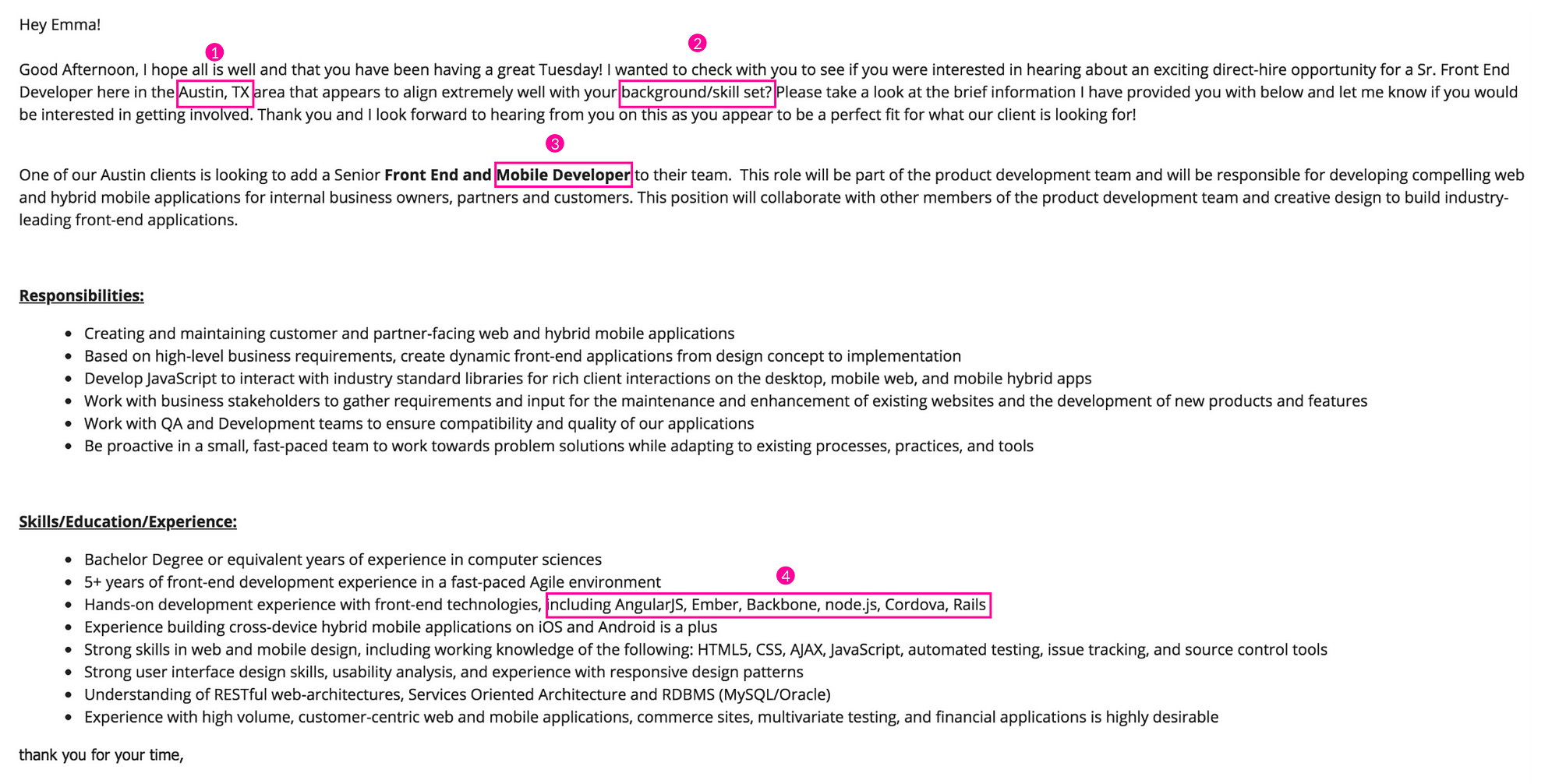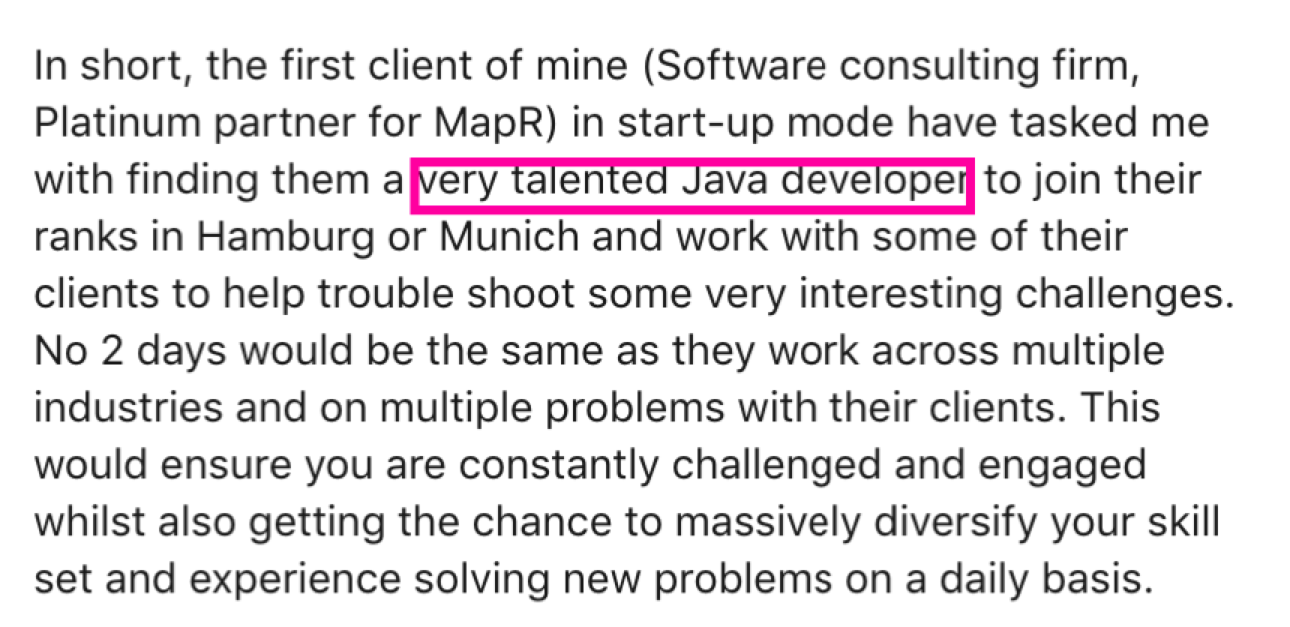Reasons Why Your Technical Recruiting Emails Are Failing
December 31, 2018

The job of a recruiter is difficult. You get tasked with recruiting the best in tech for a role you may not be fully familiar with. It’s a lot of pressure. But unfortunately you may be implementing recruiting tactics which are shooting yourself in the foot.
As someone who receives a plethora of recruiting emails a week, I’ve put together a list of my top pet-peeves and tips on how to avoid them. Let’s dive right in!
Case Study 1: Lengthy & Vague
I receive a lot of emails to my personal email account that look a lot like this. The recruiter opens with a nice sentence or two wishing me a lovey day before jumping right on in to the position. And while I appreciate the sentiment, typically the first two sentences are the only facet of the email the recruiter has taken the time to customize for me. This is a huge red flag.
Let’s walk through some of my main concerns.

1. The job is in Austin, Texas
I receive many job inquiries for the Austin, Texas area. And at first glance this might not seem like a big deal. Except for one small thing… I moved out of Austin, Texas 10 months ago, sold everything, and moved to Germany.
Many recruiters who contact me through LinkedIn could verify this information quickly and easily.
The fact that this job is in Texas shows me that the recruiter did a simple keyword search to match this role with my profile, and did not even attempt superficially sleuthing to determine if this job was truly a good fit.
Recruitment tip: If you’re trying to recruit talent, cross-check the candidate’s realistic career-based situation on LinkedIn, or a personal portfolio, with the list the algorithm spit out. The algorithm is often not presently correct and/or relevant.
2. Punctuation & Grammar Are Key
I can empathize with the fact that for many recruiters English is not their first language. I am not here to criticize sentence structure or diction.
That being said, you’re trying to convince me that this role is awesome! So why are you telling me that the job “…appears to align extremely well with your background/skill set?” Does it or doesn’t it?
Recruitment tip: Have a colleague proof-read the job application and be confident when making statements. The addition of a question mark here, while potentially unintentional, leads me to believe this role isn’t as put-together as you’re making it appear, and unfortunately I see this happen a lot.
3. I Am Not, And Have Never Been, A Mobile Developer
If a recruiter tells me a job would be PERFECT for me, then goes on to describe a skill set or role I have never in my entire life even dabbled in, I’m done reading the job description.
This is another case of the algorithm identity crisis. I have not even so much as taken a mobile development course, so no sir, I would not be a good fit for a mobile development role.
Recruitment tip: Take a quick glance through a candidate’s profile to see if their interests and/or skillsets align with a job role you’re claiming to be “perfect for them.” Some candidates may be looking to take on a completely new role, but odds are if they have nothing listed about it on their profile, it’s not for them.
4. Unrealistic Expectations
Again we have run into a case of unrealistic expectations. So often, job descriptions require hands-on experience with a multitude of full-stack frameworks and technologies. This one, in particular, requires experience with three different front-end frameworks. Stop doing this.
And literally nowhere in my profile have I ever listed Ember, Backbone, Cordova, or Rails. So am I really a “perfect fit?”
Recruitment tip: Yes, a candidate who is a master of all frameworks is preferable, but completely impractical. Instead look for a candidate with a deep knowledge of JavaScript and/or 1–2 frameworks. Candidates with continuous learning are also preferable. But, you cannot expect developers to have deep, hands-on experience with this many different variations of technology.
Overall Issues & Consensus
At a glance, this email was far too long for me to read. Normally I won’t even entertain emails this long. Give us the pertinent information needed to make a decision, and leave out all the fluff.
This email, in particular the responsibilities, were so incredibly vague that I had to re-read them multiple times to try and figure them out.
Recruitment tip: Stop using buzzwords and filler language to fluff up a job description. Keep it simple and truthful. And it doesn’t hurt to actually tailor an email to a candidate; putting in the extra effort could go a long way towards recruitment.
Case Study 2: Completely Wrong Role

I Am Not A Back-End Developer
I am not sure why recruiters seem to think I will be interested in back-end roles. I worked with Java during college, but rarely coded in it during my professional career. Had the recruiter taken even five minutes to look through my profile, they would have known this.
Recruitment tip: If you are searching for back-end candidates, do not poach front-end developers. The fields are so inherently different and 99.9% of the time you will not find a front-end developer who is willing to swap sides.
You may be able to find full-stack developers, but in general a practicing front-end developer will not be interested.
Just because someone lists PHP or Java on their LinkedIn does not mean it’s relevant. Take the time and look at what roles they’ve held in the last five years. This will be a pretty clear indicator of where they hope to go moving forward.
Case Study 3: You’re The Perfect Fit But Do You Know Anyone Else?

But Am I Really Perfect?
If you just spent an entire conversation telling me how I’m the perfect fit for a role, and upon the reception of information that I am unfortunately not interested you ask me if I know anyone who may be interested, it destroys your credibility.
Recruitment tip: Never ask this question to a candidate you just claimed was a perfect fit for the role. Instead, let them come to you.
If I know someone looking for a role like this, and you were an awesome recruiter, I will gladly hand off that information.
If instead you try and woo me like I’m the last developer on Earth, just to turn around and ask if I know anyone who is just as perfect for this role, I will immediately cease conversation with you.
Let developers come to you with information if they have someone in mind.
Conclusion
I empathize with technical recruiters. It’s a cutthroat industry and I certainly could not do it. But by implementing the tips I’ve listed above, you will quickly be on your way to finding the top talent you so eagerly seek.
I love working with good recruiters, and I’ve had several of them in my career — I even remember their names! So don’t be pushy but instead be be direct, confident and straight-shooting. Go the extra mile to ensure these candidates truly are a good fit. And add in some personal touches to show the candidate that they’re not just another name on a list, and you will find much more valuable candidates.